#secrets of the enclave spoilers
Text
Asking for the gardens and the library was a really nice touch. It is after all what pisses of El the most: how much cool stuff they create and keep for themselves. It should be shared.
#though obviously what they would do next is create more secrete library#and ferret away their favorite books for personal use#still works as a minor ef you gesture#sonntam talks#golden enclaves liveblog#golden enclaves spoilers
11 notes
·
View notes
Text
speaking in tongues
for fluffuary day 10, "secret language." minor spoilers for a side conversation with karlach in act 3 (in the lower city graveyard).
tialha is a wood elf bard who loves her giant buff fire girlfriend very much.
“Taters,” Karlach murmured, almost lost under the clanking of her greaves as she rocked back to standing with a parting caress to her mother’s headstone. She couldn’t feel it when Tialha pressed a hand to her back, not through the armor and all the underlayers, but she could feel it, in that humming way she was always aware of where the rest of their merry band of infected bastards was.
“Taters?” she asked, voice equally hushed. Suddenly it occurred to Karlach—maybe Tia had someone buried here, too. She’d lived in the Gate for a while, apparently, and landed somewhere between Astarion and Halsin on the old as balls scale that elves measured their lives by. Plenty of time to have loved and lost. Maybe someday soon, she’d stand here over Karlach’s grave with her hands clasped in that famed elven stoicism.
The engine hitched and sputtered in her chest like a caught breath, or a muffled sob. Gods, it wasn’t fucking fair.
“Meant ‘I love you’ in the Cliffgate household,” Karlach said, instead of anything self-pitying. Plenty of time for being sorry when she croaked. “I can’t even remember how it started anymore. Lost family lore.”
Older than she was, probably. Mum had liked to nuzzle against Dad’s horn in the mornings, before they left for work, drop a kiss and a soft Taters on the ridge of his ear.
“There was a lot of silly nonsense in our house,” she added, and somewhere in the back of her mind—vivid, like a real echo instead of just a memory—she heard her own small voice squealing with delight, the way she always did when Dad picked her up and tossed her toward the ceiling. “My mates used to say we had our own personal language. I guess I’m the last remaining speaker.”
The leather of Tialha’s gloves made a little squeaking noise when it rubbed against the plate armor, just to the side of Karlach’s spine. Her circlet clinked when she rested her forehead gently on the ridges of Karlach’s pauldrons. “When I was very small,” she said, still quiet but not nearly as solemn—now there was a rich warmth in her voice, and the tone set a calming slither through Karlach’s stomach, like a swallow from a warm mug of tea. “My mother and father had to leave me on occasion—it wasn’t unusual, in our enclave. Wood elves tend towards communal child-rearing. But they always told me, when I heard a turtle dove, it was because they missed me, and they’d asked the birds to pass along the message.”
It wasn’t magic—her tadpole was blessedly still, and Tia’s voice lacked the echoing reverb it took on when she started to use her words in the bending-reality-to-her-whims way—but even so Karlach could see it like it was her own memory: teeny toddling Tialha, splayed out in a forest clearing, maybe rumpled and grass-stained from chasing a gaggle of other elven kids, looking to the trees every time she heard a dove call.
“That’s fuckin’ precious, babe,” she said, looping an arm around the dip of Tia’s waist. “Did they really? Y’know, ask the birds to talk to you and all.”
“I haven’t a clue,” Tia said, and tipped her head back to beam up at Karlach. The warm-tea feeling spread into her fingers. “I hadn’t learned to speak with animals back then. But I did learn—oh, goodness, it’s been a while…”
She brought her hands to her mouth, cupped like she was holding a marching horn, and with a little crinkle in her brow she whistled; when she fluttered her fingers it made a sweet vibrato, the sound swooping like diving birds—like a turtle dove.
(Through the tadpole she felt the sparks of flickering awareness from where Astarion and Wyll had wandered off further into the cemetery, pacing through the rows, and swore she heard a snide nonverbal weirdos as the boys went back to whatever they were doing.)
“So that’s Thildran for ‘I love you’?” Karlach asked.
“Mm-hmm.” Tialha always had to stand on her toes for this, and Karlach always had to stoop, which was exactly as comfortable as it didn’t sound in armor, but it was worth it; Tia brushed a gentle kiss over her mouth, her cheek, and then rested her temple against the bridge of Karlach’s nose. When she closed her eyes and breathed she could smell Tia’s perfume, even over the stink of hot metal.
“Taters,” Karlach whispered.
“I’m a quick learner,” Tia said, sunlight in the smile she pressed to Karlach’s jaw. “I’ll teach you mine if you teach me yours.”
—
Two days later and knee-deep in sewer sludge, Karlach looked up when a soft whistle echoed off the tunnel walls. Not birdsong, but she could see Tialha grin as she did it again—four low whistles.
Karlach beamed in return and blew a kiss, and giggled shamelessly when Tia caught it.
#baldur's gate 3#bg3#karlach cliffgate#writing - mine#fluffuary 2024#sorry i've tried to keep most of my bg3 brainrot contained to my sideblog but writing goes here!#oc: tialha thildran#astarion and wyll in the background like 'what kind of gay shit are you lunatics doing now'#well. just astarion actually. wyll would think it's cute
21 notes
·
View notes
Text
Review: The Golden Enclaves by Naomi Novik
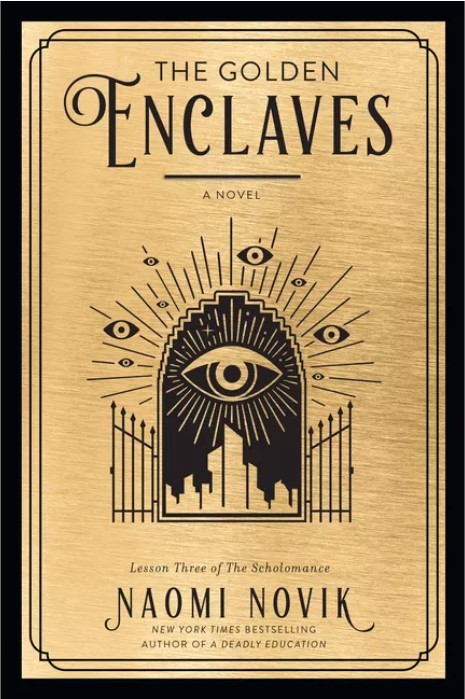
The Golden Enclaves is the third and last book in Naomi Novik’s Scholomance trilogy. I reviewed the first book, A Deadly Education, a few weeks ago. I did read the second book in the series, The Last Graduate, but I didn’t write a review for it before I read The Golden Enclaves. And to be honest, The Golden Enclaves was such a wild ride that I feel like I can’t properly do justice to The Last Graduate if I write a review for it now, so I’ll only be talking about The Golden Enclaves. This does mean that there will be some pretty major spoilers for both The Last Graduate and The Golden Enclaves, so proceed with caution!
The Golden Enclaves picks up right where the previous book left off. El and her friends have successfully executed their world-saving plan, made it out of the Scholomance, and killed off most of the monsters in the world, but at a cost: Orion is now trapped in the Scholomance, floating in the void. Grieving and traumatized, El turns around and marches right back into the Scholomance, but all is not how she left it, because being trapped in the Scholomance has changed Orion. El, Aadhya, Liu, and Liesel (the newest addition to their group) set off on an epic quest to find a cure for Orion. On her journey to save her friend, El uncovers terrifying truths about enclaves, the creation of maw-mouths, Orion’s past, and her own family. El and her friends must overcome all odds to prevent an all-out war between the enclaves of the world.
The Golden Enclaves was an absolute roller-coaster of an adventure. The plot twists and revelations one after the other as well as the gripping story made this book impossible to put down. It was so satisfying how Novik tied up loose ends, building on clues and connections from the first two books that I hadn’t noticed to lead to an absolutely thrilling climax. I appreciated how much Novik lives up to the old adage “Show, don’t tell.” Whereas some books rely on rambling monologues and inner turmoil to push the reader to feel certain emotions, The Golden Enclaves shows you how to feel perhaps a little too well. It was absolutely horrifying (to say the least) when I finally found out the secret behind enclaves, maw-mouths, and Orion’s family. Even though the book does explore El’s inner struggle, it’s never overdone or dragged on, leaving the reader to form their own emotional response. Because of how expertly the plot of this book tied into those of the first two books to build up to the final conflict, I wasn’t resentful at all at the happy ending. After everything the characters went through and discovered, I thought they deserved it. And after investing so much emotional energy into this series, I thought I deserved to see a happy ending as well.
Something I’ve come to appreciate over the course of this trilogy is the author’s ability to create powerful and morally gray characters. Even though El plays the role of the stereotypical chosen one, she is not painfully modest or self-deprecating and knows exactly what she’s capable of. I’ve read so many stories where the main character is either wracked with self-doubt or just doesn’t even acknowledge their own power, so it was refreshing to finally see a main character who is aware of their own capabilities. And despite El’s confidence in her powers, she’s never arrogant, she understands her own limits and shortcomings, and she knows to rely on her friends. This already sets her apart from many other fictional heroes and makes the entire book more mature and realistic, because as a reader, I always get super annoyed when the main character is unable to get out of their own head and be practical. El, on the other hand, is the epitome of practical. She is affected by grief and trauma just like a regular person, but she is also smart and able to think through her decisions—or at least choose to surround herself with people whom she can rely on to stop her from being reckless. The maturity with which this book approaches these ultra-powerful characters allows the author to explore the stickier, more complicated sides of the situation. When a character is already so powerful, whether or not to use their abilities become a question of morality, which El struggles with throughout the books. I loved how her mother is a huge influence on her development, and how El chooses to take the same path her mother did, despite the two of them being so different, because she finally realizes what she truly wants.
Speaking of morality aned ethics, this book also does a great job at dealing with morally gray characters. The main conflict of The Golden Enclaves is basically a magical reimagining of the trolley problem: given the choice, would you choose to sacrifice one person to guarantee the safety of your family? Or would you choose to take the moral high ground and watch as your children are slaughtered by monsters? There’s no one “bad guy” in this book, which makes it so much easier to become invested in the story. Ophelia Lake, the main antagonist of this book, has done some pretty unspeakable things, but her actions are still understandable, because she’s just doing what everyone else is—trying to survive and protect her loved ones. This is actually more relatable and understandable than the typical villain with a sad backstory, because most people would do anything to protect their families.
Overall, this book was an absolutely wild and amazing conclusion to the Scholomance trilogy. The story is original, well-paced, and gripping, and the characters are just as snarky, smart, and fun as they have been for the first two books. Novik has created an incredible fantasy world with a magic system that is unique, intriguing, and oddly realistic. The Golden Enclaves was a truly fitting end to this unforgettable trilogy.
~Tania
#tcpl#books#book review#library#ya#ya fantasy#naomi novik#the scholomance#a deadly education#the golden enclaves#the last graduate#el higgins
34 notes
·
View notes
Text
A Caveat for my super long Scholomance Essay
I got a few new followers from a recent reblog of mine so as a thank you and definitely not secret plot to scare everyone away, I got the motivation to push through and finish my essay on relationships in the Scholomance series by Naomi Novik.
It is, and this is not a joke, over five thousand words. I cite nearly a dozen sources and I have no apologies. Okay I have one apology. Sorry to the person who I will neither be tagging nor naming who said the thing about all the other Scholomance couples being monogamous that inspired me to write ten pages of literary analysis.
Anyway, continue on with your day, or maybe...?
The Scholomance through the Lens of Relationship Anarchy
I’m gonna be honest. I was shy to talk about my love of Naomi Novik’s angry anti-capitalist response to Harry Potter. Shortly after I read A Deadly Education, I read a highly critical review which addressed Novik’s diversity and said that it felt more like 90s multiculturalism than 10s intersectionality. The passage about mal hiding in locs was… bad. And having the family that El was estranged from being the Indian half seemed like having your cake and eating it too - the appearance of diversity with none of the work. I’m not going to be able to find the original review now, but I think this article from Book Riot does a good job of addressing both the criticism and explaining a less critical interpretation.
So I was quiet. I could see where the criticism was coming from but appreciated a magic school that had a different interpretation than certain others which have already been named. I decided to wait until The Last Graduate to really make any judgment calls.
In my extremely white opinion, Novik responds to criticism in both The Last Graduate and The Golden Enclaves in a way that recontextualizes the multiculturalism in A Deadly Education. This book isn’t just anti-capitalist. It’s anti-imperial. Places like New York and London are given more weight because the whole Scholomance is a metaphor for imperialism. The very foundation of the way they’re doing magic is imperialist and corrosive to the soul. But I don’t want to get into all of that until I can really chew on it, since my lack of personal experience as a person of color means I need to bring receipts and a body of research if I plan on speaking at length on that subject.
I bring it up in context to say that Novik’s The Scholomance series has received valid criticism from various fronts throughout this series. But I think a deeper reading reveals that the thing which you are criticizing was part of the point the whole time.
I feel similarly about “the cheating subplot” in The Golden Enclaves.
“The Cheating Subplot” is not how I would categorize it. But I’m responding to this Goodreads review and a lot of interpretations which, as far as I can tell, were influenced by it.
To summarize, because there’s no way to talk about this without spoilers for The Golden Enclaves, Orion has pushed El away only to, as far as she is aware, be eaten by a maw-mouth. Liesel shows up, and starts trying to actively seduce El. At some point, while processing her grief, she has sex with Liesel. Then, Orion comes back, very much alive. Then he leaves again. More El/Liesel bonding ensues in an airport loo, then Orion comes back, and El and Orion probably get back together.
This has been called a cheating subplot, partly for sleeping with Liesel the first time when she “knew he was probably alive.” And the second time when he was definitely alive and just not around. And at no point does El mention she’s slept with Liesel to Orion. I have a handful of issues with this, and I’m going to address the more minor issues before we get into the meat of it.
Does El actually sleep with Liesel the second time?
This is splitting hairs, but when I read that section, I stopped, went, “wait they didn’t have sex though” and then read the passage again, and concluded that no, they had not in fact had sex. So when I saw people claiming on the internet that sure, he was dead the first time, but definitely not the second time, I was genuinely confused. There was no second time. So I’ve copied the entirety of what could be the description of El and Liesel having sex on the plane.
And Liesel was right: it helped to feel good in my body, her hands and the water running over my skin reminding me that I was whole, even if I didn’t feel that way, telling me I was still all in one piece at least on the outside.
That’s it, that’s the whole description. You can infer that they had sex, but it isn’t stated. What if, instead, they just showered together? Is it still cheating then? Some people would say yes, because you’re naked and intimate with another person. But some people would say no, because that’s not sex.
Does El really not mention it to Orion?
One of the linchpins on this argument is, it’d be fine if El mentioned it to Orion, but she doesn’t. But… does she not?
After all, we don’t hear every single conversation that people have - just the important ones. Or rather - just the ones that our unreliable and emotionally stunted narrator considers to be the important ones. This series is narrated by El to a mundane to describe how she became a maw-mouth hunter, essentially. Is “and then I told my boyfriend I slept with Liesel” really that important of a conversation to include in the text of the book? Couldn’t we just assume they had that conversation? After all, she does have that conversation with Liesel, in a way that makes plot-relevant sense. We could infer that she’s mentioning it to Orion in the same time frame (and if it seems like a stretch to infer that, see above inferred sex scene).
But I don’t think this is a likely place for this conversation to have occurred because Novik herself says that things were too busy and chaotic for most of the book for relationship negotiating to have been a priority.
The second place El could have mentioned it was in the epilogue, when El hand-waves away several weeks of serious emotional labor into a single paragraph. That would have been the place any rational person would have mentioned their fling to a partner.
We’ve been told in this book by El that she’s perfectly happy as a narrator to hand-wave away huge chunks of the story. I think it is plausible for these two to have had a conversation off screen and for El to just not feel the need to tell us that. This brings up one of the theory points which I’ll circle back to when I get to the theory part - it isn’t enough that it’s possible for those two to have had the conversation. The audience feels the need to have this relationship norm performed for them, so they can assuage their concerns that this might be cheating. But that brings me to a new question…
Assuming their relationship is exclusive, was El under any obligation to have mentioned it to Orion?
Okay, let’s assume that El and Orion are exclusive during the periods that they are dating, with the normal caveats that would apply to any relationship.
The first time El has sex with Liesel, Orion is dead.
Or rater, El has been presented with a situation wherein the only possible outcome is eternal torture worse than death, and the person she loved is effectively dead because he cannot be brought out from that eternal torture except through death. Point being, it is not cheating to sleep with someone after your partner dies.
Orion comes back, and El and Orion get back together, but is El under an obligation to tell him any and all people she’s slept with while they weren’t dating?
I would argue not, because it isn’t a parameter that’s applied consistently in monogamous relationships - in fact, if anything, we’re discouraged from telling our current partner our relationships before then. And what happens “on break” in my experience depends on the people involved - some people don’t want to know, some people do. But if it’s dependent on the people involved, the only time El would be obligated to tell Orion about the first time she had sex with Liesel would be if the words “did you have sex with anybody while we were on break” came out of Orion’s mouth.
So what about the second time (which again, I would argue is ambiguous)? Well, I think it’s pretty obvious that they’re on break. Orion leaves to join his mother, who El will have nothing to do with, and before he leaves, Orion tries to ask her to promise to kill him if his mom can’t fix him. They’re saying goodbye. It is unlikely these two will ever see each other again.
So if El and Orion are on break when she sleeps with Liesel the second time, why would she tell Orion about it? They weren’t dating at the time.
And this is the stance Novik seems to come down on as well, because in her AMA on this question she says, “if El ever wanted to hook up with Liesel again, I think probably a conversation would happen at that point.”
Because it would be at that point that she would actually be dating Orion.
But I also think we shouldn’t assume that their relationship follows the rules we’re expecting. After all, Novik also has this to say, “To me, it's just, people have different kinds of relationships with different people.” So…
Do we know for sure whether or not El and Orion’s relationship is exclusive?
Actually, scratch that, and let’s dig into the meat. When I was arguing on the internet with someone about this, they said “the only other canon Scholomance couples we see are all monogamous.”
That’s already a pretty loaded statement, to be honest. We’re already pre-disposing ourselves to assume both that the people we’ve heard about relationships from are monogamous, and that the default state of Liesel and El and Alfie and Orion is that they are all supposed to be monogamous -this person doesn’t just say “the other relationships are monogamous”, they say couples specifically. But just because a relationship looks monogamous doesn’t mean that it is.
It’s probably for this reason that my irl partner is extremely careful to shoehorn in references to the other people he’s dating whenever the opportunity presents itself, because we live together, and people assume we are monogamous unless we state otherwise.
I want to set aside this assumption, and look closely at the text to see what norms Novik is really setting for us. To that end, I’ve scoured all three books for every example of relationship drama, and I think Novik is inadvertently saying some rather profound things about the hegemony in monogamous heterosexual relationships in patriarchal post-imperial countries that doesn’t mesh with an anti-colonial anti-capitalist agenda. In simpler, but less accurate words, non-monogamy is anti-colonial. And I think Novik’s descriptions of relationships bear this out.
All of the parents that we see are a straight couple with biological children. No one has gay parents. No one is adopted. Even these cookie-cutter relationships still have a decent amount of variability. Gwen is raising a child on her own as a widow. Liesel’s father was having an affair. But heteronormative expectations for these two bear out. To our knowledge, Gwen never moves on. She is never described as having any intimate relationship with anyone else, despite living on the kind of neo-pagan commune which in my limited experience is absolutely rife with free-love types. Gwen is the textbook perfect example of a mourning widow. She has sex with her high school sweetheart, what, one time? Certainly a limited number of times if El’s statements on the lack of opportunity are to be believed. And loves him and only him for the rest of her life.
Meanwhile, Liesel’s mother is punished for sleeping with a married man - killed for it in fact. And her father is as distant as cheating husbands have ever been stereotyped to be.
So I would still argue that all four of these examples are a body of expectations - of amatonormativity - which is, at the end of the day, rooted in the same colonial, patriarchal mesh that had them building a school on the backs of dead children.
Meanwhile, this new generation of children are doing something different.
Rule one about whether or not something is a date or an alliance is if they do something with you and don’t ask for fair share in return. And that’s pretty much all we’re told about relationships for quite a while - El doesn’t even notice that Ibrahim and Yaakov are already dating.
Our protagonist is willfully oblivious to most everyone around her, so we don’t know much about anyone really. The first hint of an inkling of anyone’s thoughts on relationships other than the one El’s only pretending to be in, really, is when a girl propositions her and Orion for a threesome in the library.
And that is literally the only two mentions of relationships of any kind in the entirety of A Deadly Education. I checked.
During their senior year, more people are dating. Ibrahim and Yaakov are revealed to have been an item for an unspecified amount of time previously, Liesel starts pursuing Alfie, and Liu has her own fair share of relationship drama.
And don’t forget about Jermaine!
… Here’s the thing. I know for a fact that you forgot about Jermaine because it took me two solid weeks to find this passage again.
We knew that Jermaine from New York had spent the last year in a competitive love triangle with a boy from Atlanta over one of the top alchemists, and we all knew when in a perfect storm of gossipy delight it turned into a trio and an alliance, halfway through the first month of term.
This is in chapter 9 of The Last Graduate, right after El catches Ibrahim and Yaakov kissing, and she explains that there’s just not a lot of romance drama to be had when you’re fighting for your life every day, but that they chewed very thoroughly on the drama that they did have. Jamaal was courting a girl from Cairo “by the book,” and Jermaine had wound up in a triad.
And on that note, I want to come back to Liu’s relationships, because of a very specific line towards the end of the book.
“What was up with letting us hassle you about Zixuan all this time! Or were you trying to decide?”
Here’s the thing. There’s a strong implication in this one line that when Liu kisses Yuyan two days before graduation, she hasn’t severed her flirtation with Zixuan. That’s still on the table. She wants to want the right things.
The Thesis
So when I say “how do we know for sure that El and Orion’s relationship is exclusive”, it is in the context of the kinds of relationships we’ve been presented with throughout the entire trilogy. And across the entire trilogy, rather than “the only other canon Scholomance couples we see are all monogamous,” of all the romances we see from the kids in the school during El’s tenure, less than half of them are in completely exclusive monogamous relationships. And only one of the couples is heterosexual.
And I think it does bear noting that there are several hundred kids in each grade, and we don’t know the relationship status of most of them. But I want to circle back to the very first thing we learn about relationships, because I think it bears repeating.
Rule one about whether or not something is a date or an alliance is if they do something with you and don’t ask for fair share in return.
El is in an alliance with Liu and Aadhya. She winds up adding Chloe to the alliance. So… what about everyone else? El spends the entirety of Book 1 criticizing Orion for doing things for other people without asking for fair value, then spends the entirety of Book two doing things for other people without asking for fair value.
It can be interpreted that this is a rule El made up in her head that doesn’t actually have any basis to the other Scholomance kids, but I think this is the more shallow reading. After all, if we compare it to El’s understanding of the Scholomance, she’s shown to have a better understanding of it than most throughout - even at the beginning.
I think instead it is one of many examples of the layers that get peeled back across each book. There is the Scholomance as everyone else sees it, the Scholomance as it sees itself, and the Scholomance as it truly is. Each peeled-back layer reveals a truth about El too. In Book 1, the group’s understanding of El is one of grim prophecy - they all believe, even herself, that she has the power to undo them utterly. In Book 2, that force is used for good, and the El she strives to be shines. But in Book 3 we’re given the truth - that the El of grim prophecy and the El as a radical force for good are the same, and the system needed to be brought down.
Book 1 through the lens of El is largely devoid of romance or sexuality at all. She doesn’t see herself as capable of those kinds of feelings and therefore misses them in others. Book 2’s relationships are largely about expectations. Liu struggles with the expectation of choosing Zixuan, El struggles against her mother’s wishes, Liesel seeks an advantageous position, and Yaakov and Ibrahim are found out by accident. There’s a self-consciousness to the relationships in Book 2, an awareness of being observed.
If Book 3 is how the relationships truly are, then the important takeaway from the addition of El/Liesel is that relationships are messy and undefinable. They happen or not, with societal expectations or not, and sometimes they’re happy and sometimes they end tragically and sometimes you do something stupid because you want to.
And, I think critically and the reason I think there’s a deliberate amount of relationship anarchy in this book: romance is only one way of forming connections. In The Golden Enclaves, El is finally back with her Mum, previously the only person she could confide in, except this time, it feels hollow and empty, because of all the things she’s learned and the person she’s lost. Liesel reaches out because London needs help. They meet up with Alfie there too of course, and then decide to talk to the New York Domina. Aadhya drives them there, and Chloe meets them outside to do introductions. El gets coordinates to the real entrance to the Scholomance and rescues Orion, both Aadhya and Liesel coming with. They go back to Mum’s commune and all five of them spend some quiet time together, Mum and Orion needing to heal. Then Liu calls, and the kids have to rush off to Beijing. They meet up with Zheng, the younger cousin El has bonded with just a few months prior, and rescue Liu from a horrible fate. But in the meantime Orion can feel himself slipping away, and he leaves. Liu needs to heal, so Aadhya decides to stay with her, and Liesel and El go to Dubai - they’ve been told they’re next and want help from El.
They’re met at the entrance by Ibrahim and Jamaal. By the way, do y’all remember “by the book” Jamaal? I find it interesting that Novik mentions his grandfather has three wives (pg 308). And then we find out that Ibrahim and Yaakov, who’d had such a romance in school… couldn’t stay together. They’re from different enclaves. The systems in place tore them apart. But then, because more than just El needs to cast the spell, and the people chanting need to live there, the Dubai enclave guarantees that anyone who agrees to work on El’s golden enclave spell gets a spot in Dubai. And all of a sudden Cora and Yaakov are both with Ibrahim in Dubai now.
Afterwards El leaves for Mumbai to confront her past and it is the only time in the entire book that El is alone. And once she’s done some important self reflection, she goes to the gates of the Scholomance again, and meets up with Liesel and Alfie, Aadhya and Liu, Khamis, then most of the seniors there, and eventually Orion again, who has been in the book less than half the time and who, it is revealed, was literally dead the whole time. Orion as a living, autonomous person exists and is present in the book for seven pages.
Novik’s romances are some of my favorites, because they are always grounded in a person’s complexity. The women in her books don’t become mothers and vanish from the page the moment they find a man they like. They exist for themselves, and love incidentally to that. It’s something that feels unusual next to even feminist books like the Vorkosigan series.
The Golden Enclaves seeks to break the systems of power that have held El et al captive through the first two books. That includes the expectation so ingrained in our society that most people don’t even know it’s there that a romance is the best and most important thing that can happen to someone.
Having said all that, I want to conclude with an additional side examination. I don’t think people are correct to interpret this as a cheating subplot, because of all the reasons outlined above, and because, like everything, the relationships in The Scholomance series are about so much more than simply X/Y. But even if the interpretation that it is a cheating subplot is correct…
Is The Cheating Subplot Really So Bad?
Young people forget what it’s like. But I’m like, five thousand in internet years, and I remember. The first girl I ever made out with had a boyfriend at the time. So did the second. And the third.
I’m reminded of The Price of Salt AKA Carol. Or Fingersmith. Young people can call cheating a “bisexual stereotype.” But when I was younger, it was a survival tactic.
I’m not saying that this is what Novik is trying to portray. But I can say that as someone who was part of a Star Trek mailing list back in the early days and founded AO3, Novik knows what it means to be queer. And relationships when you’re queer are messier. They’re freer. They’re defined by what you say and what you don’t say, which may seem obvious, but too many relationships are defined primarily by what a relationship should look like, and not at all by what you do or do not say.
El and Orion are dating for a year before she realizes it. That’s pretty queer. When El gets him back, there’s never an explicit conversation that they’re dating again. They have sex, but their relationship is fairly undefined. Novik has even explicitly said their relationship remains specifically undefined because El is unused to and uncomfortable with being intimate with people. And we see this, again, not just with Orion, but with every relationship, even the platonic ones. El doesn’t like so much as admitting to knowing someone’s name, because learning their name means caring about them as a person.
There’s never any discussion that El and Orion’s relationship is exclusive. That doesn’t mean that it is, but it doesn’t mean that it isn’t, either. One could see this as cheating, or you could not. But even if it was… why is that something to knock a series you love from five stars to two?
That feeling that you’re having right now? That discomfort? That says that this is running against a taboo that you have. And maybe it’s a taboo that you have for a very good reason. But my point is that you’re responding emotionally, not rationally. And rationally, there’s a lot of good reasons one might have a cheating subplot. Because it wasn’t acceptable at the time to date other women for example. Or to highlight that our characters are still just teenagers, and prone to making bad decisions. Or to draw attention to the messiness that comes even from protagonists, who are traumatized, and just need a little bit of human connection, even if they know it’s stupid, and will probably hurt them in the long run.
Cheating is an extremely human thing to do. Numbers on this are pretty hard to find, but studies estimate that around 1 in every 5 people admits to having cheated on a partner. How many partners have you had? Is it more than five?
I’ve been the person being cheated with, as I’ve already mentioned. But I’ve also been cheated on. Sometimes, authors say things that are true, and it isn’t acceptance of the thing, but merely a reflection of lived experience. These characters are teenagers. Teenagers make bad decisions with little forethought. Why can’t we simply have a messy character? Why does the existence of a cheating subplot have to be treated with such vitriol and hatred?
I think the problem is twofold. A, for lack of a better word, uwu-ification of media which encourages cutesy, shallow stories, and an expectation of conformity due to capitalist streamlining and fan pressure.
Uwu-ification
The world has sucked for kind of a while. Things are improving in fits and starts, but in the meantime my generation has seen multiple unprecedented generation-defining tragedies. 9/11, the war on terror, the 2008 financial crisis, COVID, the first coup attempt in 300 years, the COVID recession on top of COVID, a massive uptick in mass shootings and in specific school shootings, just to name the most prominent ones. And the commodification of attention that blossomed with social media means that even what should be good things about this generation - the absolutely incredible technical advances - still sap away at our mental health.
On top of that, you have the decimation of the long-form essay. I’ve been working on this essay for weeks, read two books and multiple articles, and right now, it’s nine pages long.
Who the fuck is going to read this? Why would anyone read this when they could just check Twitter for a bite-sized hot take instead?
This is starting to change. Podcasts are growing in popularity quickly, and you can also find a lot of long-form essays on youtube (though they’re all, they tell me, going to Nebula). But long form essays are a huge time commitment, and a niche interest, all things told.
This is, I have no doubt, exacerbated by the crimes against education George Bush installed. No Child Left Behind was a fucking travesty and absolutely has eroded critical thinking skills substantially. Engaging in that type of deeply analytical pondering takes a lot more energy for someone who wasn’t taught how to do it as a child.
So we all have PTSD or at the very least chronic anxiety and on top of that we don’t have the training necessary to unpack our own trauma. Millennials and younger really just want to relax. They want to sit on the couch and enjoy something charming, and cute, and not painful (that or like, deeply terrifying and gory horror, don’t understand that one).
And I’ve absolutely been that person. Sometimes I just want something cute and charming and fun that I don’t have to think that hard about.
Fan Pressure
But… It seems like on top of this desire for everything to be only the happy parts of Hayao Miyazaki, there’s also this really aggressive push against anything that’s not. Internet collectivism can absolutely be a force for good. I think campaigns to draw attention to people like R Kelly are a good thing.
And also, special interest groups have realized that if they pool together their collective resources, they can campaign for change they want to see. Doesn’t mean they’ll always get it, but we know that if we just use the right hashtag, and just tag enough people, someone who matters will see my tweet about how Destiel should be canon. Even if they don’t listen, they can’t avoid hearing me.
And I bring up Destiel specifically because what we’re talking about is fandom and fan behavior as it pertains to creators and creations in general. Supernatural fans have done a lot of good (raising huge amounts of money for charity) and a lot of bad. But I’m not the only one who has wondered if maybe this ability to amplify one’s voice can be… kind of dangerous. Being able to leverage your voice to call for more representation is good. But that’s not the only thing that gets leveraged.
This is no doubt exacerbated by the way mainstream media has become more and more algorithmically streamlined - catering to the widest audience means producing the same reliable and meaningless format over and over again. I could write another (whoops I’m up to ten now) pages on the finale of She Hulk and its manufactured consent to Disney-fied conformity all on its own.
So what does this mean for The Scholomance?
To bring this back around, because that was a lot of background that felt irrelevant: people want works that they consume in general to be less realistic. They want something cute and easy (or action-packed and easy, or gory and easy). They leverage this to actors and creators, who respond by providing that thing people want. This is all fine so far. But then you get this amplified by the tendency towards monopoly - stories whether they be books, movies, or tv shows, are published because they’re believed to be profitable, and something which is profitable right now is the most processed kind of junk food media you can make.
But then you get someone like Novik who is portraying an imperialist system in her magic with the intent to destroy it, or who has time-period accurate relationships, including all the lack of consent, or who has messy romances that kind of feel like cheating, and it seems like suddenly, it doesn’t just feel like something different. It feels like a betrayal. Fans aren’t just surprised. They don’t say this one’s not for them. They say they’re disappointed, gutted, devastated. How could Novik have betrayed our trust by adding this kind of a story element… Reach out to Novik and make her change it!
And that’s… not really okay. And that’s the problem I have, ultimately. Because you don’t speak for 100% of fans. You don’t speak for me, certainly. And even if you did speak for all fans… is populism really the ultimate truth in our society? Do we only want things that appeal to the broadest group of people?
I don’t.
#the scholomance#the golden enclaves#spoilers#i don't tag my works long post because#look comparatively it's not that long#disk horse#relationship anarchy#queer#orion/el+el/liesel+liesel/alfie is my otp#otp stands for one true polycule
60 notes
·
View notes
Text
FoTV, and an interesting absence
I have now seen the last couple of episodes of the Fallout TV series, and I have a few thoughts.
SPOILERS in here, of course…
First of all, the last two episodes were basically one O.o moment after another.
Lucy's father being a genuine monster, the nuking of Shady Sands, Norm's discoveries in Vault 31, Barb was actually evil the whole time, the way the Brotherhood appear to be being their absolute worst selves here, the US government was actually in secret peace talks with China(!!), the whole 2070s energy crisis already had a solution (at least for consumer electricity), there's LOTS to unpack.
Oh yes, and also the fact that Vault Tec apparently cosplay as Pentex, so there's that too.
But, but, but … one thing's nagging me.
Specifically, it's one detail. It's from the pre-bombs meeting that was effectively chaired by Barb, where Vault Tec was setting up its corporate camarrilla. You see, there were a couple of interesting omissions from the attendance list. Pre-War corporate America was well-represented … but where were Poseidon Energy?
Seriously, where were they?
They were presumably one of the most important companies in the pre-War economy. Energy supply would be a key issue for any Vault, whether control or otherwise, and an energy crisis was the underlying economic crisis that was driving the War. You'd think they'd be heavily involved in any construction project. So, to my line of thinking, Poseidon's absence feels a little odd.
But perhaps, just perhaps, this is hinting at something.
Consider - we know from canon that the pre-bombs president's emergency base was on a Poseidon oil rig. We also know that Vault Tec and the US government were at least slightly at cross-purposes by the day the bombs actually fell. It's also interesting that later in the TV series timeline, the Enclave - the last remnant of the pre-War government - were apparently aware of and working on cold fusion technology.
There's also another mildly-odd detail about Poseidon Energy. We know from Fallout: New Vegas that they - them! of all people! - were doing some research into sustainable energy in the late 2070s. Helios One was one of their facilities; there's also (if I remember correctly) a derelict wind farm that you can find in the Mojave, which also was one of theirs. On the face of it, an oil company doing renewable energy seems incredibly-odd - but, that said, if anyone out there had a realistic sense of where the hydrocarbon-extraction economy was going, it would presumably be them!
And this brings us back to their absence from Vault Tec's camarilla. It's not quite clear where all of this is going, but it feels like something is going on here. The government must presumably have been aware of at least some of what Vault Tec was doing - VT were, after all, a monster very much of their own making. Were they trying to use Poseidon as a counter-balance to VT? Was Poseidon meant to independently re-discover cold fusion, possibly?
(This was a bit I'll admit I didn't quite buy … the narration in the show made it sound like VT had somehow copyright-locked the underlying physics of the cold fusion reaction, which makes no sense whatsoever. Physics just simply doesn't work like that - the whole point is that there is no privileged, mystically-esoteric initiatory knowledge, it does indeed [to borrow a phrase] "just work". I think we can rationalise this as VT doing a DRM-equivalent on whatever kind of power cell that was required to run the reaction, though. Presumably what Wilzig had figured out was at least a partial way around this, so that pre-existing power cells could be retrofitted for cold fusion utilisation.)
(Oh, uh, also the fact that apparently all the transmission links, substations and light bulbs in the ruins of LA have somehow surrounded not one but two rounds of nuclear bombing, and 200 years of wind, rain, looting and generalised entropy. I know Fallout is a scavenging world, and yes the visual spectacle was powerful, but this did feel a little silly to me!)
Now overall, I'm not quite sure where all the evidence here is pointing. But, that said, I wouldn't be surprised if we hear a bit more from Poseidon Energy in Season Two…
2 notes
·
View notes
Text
14yr olds have the most insane intuition my brothers managed to guess so much random shit about new vegas correctly. i mentioned like “ohh arcade has a big secret” and he kinda just sat there and thought and looked at me like. “ohh is he like the guys from The Military(enclave)” HOW??? HOW DOES HE KNOW!!!!!!!!!!!!!!!!!!!! HES NEVER PLAYED THIS GAME AND I KNOW HE DOESNR CARE ENOUGH TO LOOK UP SPOILERS TO BOTHER ME
1 note
·
View note
Text
FFXIV Write 2023 Day 21: Grave
In which the WoL is asked a question.
Enjoy!
Rating: G || no CWs apply (but discussion of death throughout) || slightest of EW spoilers
“Do you know where you’ll be buried when you die?” he asks.
He watches his sister look up at him with some alarm as she raises an eyebrow. He stares back at her and chews on his cheek and waits for her response.
It was a bit of an out of pocket question as they sit in the One Garden after another brutal training session, but it’d been on the forefront of his mind lately since visiting home again for a reprieve.
“What brought this on?” she asked as much.
He shrugs and leans forward as the nerves catch up to him, “We have a family plot, you know? In Sharlayan,” he begins. He already knows that's the wrong answer and the way her body stiffens confirms that. “I-I just. Went to visit it when I was home. It’s…odd to look at now. Wondering what other secrets they buried down there with them,” he continues.
She lets out a sarcastic laugh, “I…you know that place is not my home. I doubt there’s even a spot for me,” she says.
There isn't, he knows. On the nameplate is only one empty square. Still, as ill it is to speak of the dead, he'd gladly dig one of them up to make room if that's what she wanted. But it isn't.
Her eyes go somewhere far away and he regrets asking now. “Most I knew before all this were cremated and just scattered with the desert winds. Or left where they fell, to be taken by the earth.” she says, “When I almost-” she hesitates. “I did die once, you know.”
He chokes on his tea and sputters out a coughing fit as he looks at her with wide eyes. She smiles sheepishly and waits for him to finish. “When?”
“Ultima Thule I…after Zenos fell. I didn’t tell you before because well, would you have believed me.”
He doesn't really believe her even now so he stays silent.
She lets out a laugh, “exactly,” she pauses, “I’ve tried to not think about death since then. Though it's been hard, to say the least.
“Oh I’m sorry I-I didn't mean to-”
“No,” she cuts him off, putting a hand on his shoulder, “No it’s okay. It’s. You don't need to apologize.” She looks out onto the Enclave and her eyes grow deeper again. “I don’t think I’m built to have one final resting place, to answer your question. My heart is in too many places.”
It's his turn to now look around the Enclave, a beautiful place that she’s had so much of a hand in rebuilding. After everything, she’s still the first to shy away from its attention, but he knows what this place means to her, and he hopes to feel the same about somewhere, or somewheres, one day.
“Now. Are we going back to training or do you have any more deep questions you want to blindside me with?” She asks, her voice light and teasing.
He laughs as he stands, “We’ll see what else comes out while you’re hitting me with a fireball,” he answers.
She just shrugs and runs off back to their makeshift training ground near the schoolyard. He thinks back to the grave site where his parents lay, and wonders what they'd think of him now.
1 note
·
View note
Text
The Golden Enclaves / Naomi Novik
Scholomance #3
[Deel 3 van een trilogie: Spoiler Alert voor wie deel 1 en 2 nog niet heeft gelezen!]
Als ze eenmaal buiten was, de Scholomance had overleefd, zou El samen met Orion nieuwe, kleine en alleen op mana gebaseerde 'gouden' enclaves gaan stichten. Dat was haar grote droom. Maar nu is zij buiten, terwijl Orion is achtergebleven in de Scholomance, alleen met alle maleficenten die ze zo succesvol hadden aangelokt en de reusachtige maw-mouth Patience. El wil zo snel mogelijk terug naar binnen. Dat is niet zo eenvoudig, zonder steun en een flinke voorraad mana. Ondertussen wordt ook steeds vaker een beroep gedaan op haar unieke vaardigheid om met maw-mouths af te rekenen. Tijdens haar zoektocht leert El haar ware vrienden kennen, én een heleboel meer over de duistere geheimen die ten grondslag liggen aan de enclaves.
“Yes,” I said. “It matters. I’m not going to help you reattach the Scholomance and dump all the maleficaria in the world back in, just so your enclave can keep the power it represents.”
She gave a snort, like I’d said something funny. “Power? It’s a giant mana pit. We’re carrying more than twice our fair share, we cover all the shortfalls. But it’s still a massive chunk of capital infrastructure, and it’s the only long-term solution we’ve got. Yours is just temporary. We’ll be right back at the seventy-five percent child mortality rate in sixty years, and then we’ll have to build another Scholomance. I don’t want to throw this one away. At the very least, we should keep it going on a subsistence level until we need it again. What I’d really like is to find some way to use it to repeat your technique on a regular basis instead, but from what we’ve heard,” she nodded towards Chloe, “it’s not going to be all that easy.”
“Wait,” Liesel said sharply. “Why so soon? We calculated that it would be more than a hundred years to reach a mortality rate of fifty percent. That was why it was worth it, sacrificing the entire school—”
“I’m guessing you kept the maleficaria generation rate steady when you crunched your numbers,” Ophelia said. “It’s not steady. The more wizards there are—and you just saved a whole lot of them—the more mals there will be.”
“Why would more wizards surviving mean more mals?” I said. “We’ll kill mals.”
She gave me what wasn’t quite a pitying look, because she didn’t have enough pity to manufacture one. “We’ll make more than we kill. Did you think it was all crazy maleficers in secret labs cackling, or careless mistakes? Any cheating does it. Remember? You must never use any mana you do not generate yourself. Any use of malia leads to the generation of maleficaria. First page of every single textbook, the Freshman Orientation Handbook, the contract you signed to get into school?”
I did remember it, and sourly, because no one else paid any attention to it. The real reason no one used malia at school was because there weren’t a lot of options for getting hold of it. Outside, almost everyone cheats at least a little; they steal from ants or beetles, wither a vine or a patch of grass, without ever seeing the damage they do. Mum didn’t let me get away with that sort of thing, but most parents do it themselves.
Ophelia nodded. “Whenever somebody needs a little more mana than they’ve got, they steal it from somewhere, seems like no big deal—but you end up with a negative flow of mana. When that negative flow gets big enough, a mal will generate around it. It’s not a secret. But people do it anyway.” She lifted her hands to the heavens.
In dit laatste deel komen alle lijnen bij elkaar en ook kleine dingen uit het eerste boek blijken van groot belang. Het zit allemaal heel goed in elkaar; geen simpel goed versus kwaad. Erg fijn leesvoer!
1 note
·
View note
Text
SWTOR and Force Empathy, Revisited
Spoilers for SWTOR content up to and including Secrets of the Enclave (6.3).
So I hypothesized before about what is going on with the comments from the PC and the NPCs in Secrets of the Enclave, alluding to the fact that the PC isn't able to feel things around them like Rivix, Krovos or Aryn Leneer. After playing through with a Jedi Consular, I really feel that the hypothesis that the PC can block what is around them is fair.
I don't think i t's going to be a deficit - I think it's going to be one explanation as to why the Commander is so exceptionally dangerous.
I think that while Force Empathy can be a special trait, completely concealing one's emotions/cutting oneself off from sensing things in the Force can also be a talent. I think it's one that can be exhibited by non-Force sensitives too - Theron is not Force sensitive, but his mind cannot be read by Lana, the Revanites OR the Order of Zildrog. Lana out and out says his mind cannot be read.
I think it's a two way street - the PC blocks both incoming and outgoing traffic, so to speak. Because it's coming up that other characters cannot sense the Commander's presence or read their thoughts/emotions.
It would also completely explain why the PC is so overpowered a lot of the time, even against Force sensitives. Their actions and intentions can't necessarily be read. Two more things have jumped out at me.
Spoilers for SWTOR content up to and including Secrets of the Enclave (6.3).
In this scene after Secrets of the Enclave, the Commander stands in the doorway listening to Rivix's conversation with Acina/Vowrawn. When they make their presence known, Rivix jumps and is visibly frightened.
Darth Rivix cannot sense the Commander standing in the doorway. He also appears afraid of the Commander, but let's leave that for a second. Let's focus on the fact that Rivix, who was all "I sense all this in the Dantooine Enclave, I'm surprised you don't" cannot sense the Commander, who appears to be standing about 6 feet away from him.
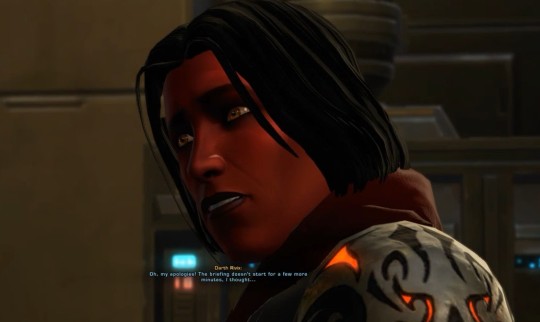
Darth Rivix: Oh, my apologies! The briefing doesn't start for a few more minutes. I thought...
On Iokath during KOTET, Lana can only feel the Commander is alive if she's romancing them. She's also especially thrilled about it. That would imply, in addition to the Force bond that has been mentioned in the canon, that the guard is down only because the Commander is close to her.
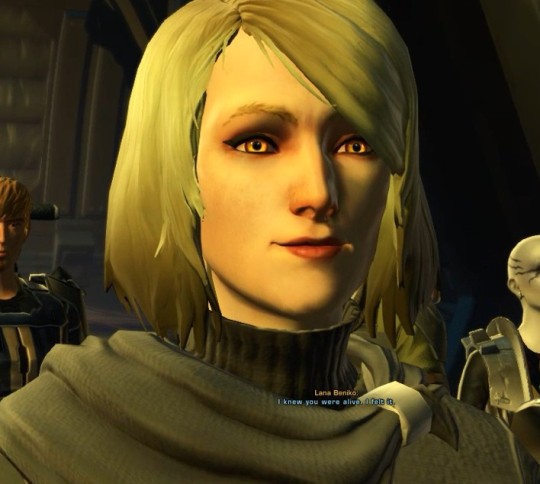
Lana Beniko: I knew you were alive. I felt it.
Also:
1. The Sith Warrior can successfully lie to Darth Baras from the time they are an acolyte. When Baras sends you to kill Tremel, if you refuse, there's never an indication Baras ever finds out until the end of the class story, when Tremel appears again. The same is true for Rathari on Nar Shaddaa.
2. The Sith Warrior can also apparently mask the fact that they live after the Quesh betrayal, until someone (likely Quinn or the Entity) tips Baras off.
3. The Sith Warrior can also stand right behind Baras when he's talking with Darth Vengean, without even being noticed.
4. The Sith Inquisitor can also completely conceal their thoughts from their mentor. Zash doesn't know about the Inquisitor's relationship to Lord Kallig unless the SI tells them; she also doesn't know how the Inquisitor recovers that holocron on Korriban unless the SI chooses to chare.
5. The Sith Warrior can completely hide from Darth Ekkage in the same room.
6. Valkorion is in the Commander's mind but isn't able to see what they did on Nathema or if they spoke to Lord Dramath or picked up the holocron. He later asks directly about that twice and can't see beyond what the PC tells him.
7. All eight classes can resist the Dread Masters on Oricon.
8. All eight classes can resist Vitiate on Ziost.
9. In KOTFE/KOTET, Valkorion is in the Commander's mind, but only has control over the Commander if he is directly summoned and given permission; or if the Commander is incapacitated at that moment.
10. In the Dark Temple on Dromund Kaas, there are three separate side quests where all four Imperial classes are said to be "immune" or clearly not feeling at all influenced by the spirits in the Temple. They also can clearly see when others are possessed.
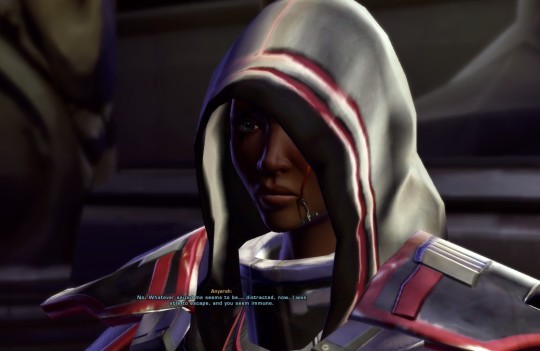
Aneryah: No. Whatever seems to be...distracted, now. I was able to escape, and you seem immune.
11. For the saboteurs in the audience, it's always seemed foolish that the factions would trust the PC in spite of everything. Only Malgus and the Jedi at the end of Echoes seem to have suspicion. Everyone else just seems to assume the PC is on the up and up with them. But if they can completely conceal their thoughts and motives it makes much more sense.
#swtor#headcanon incoming#swtor spoilers#swtor 6.2#secrets of the enclave spoilers#secrets of the enclave#rain talks swtor
82 notes
·
View notes
Text
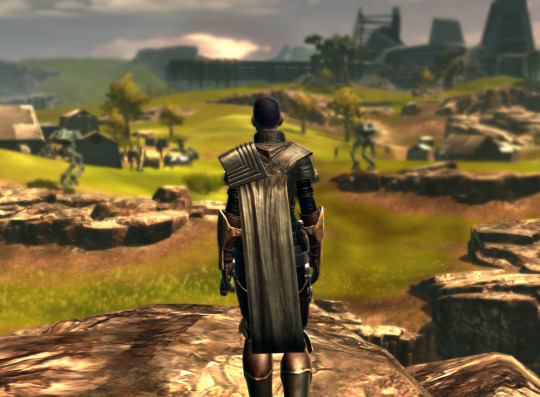
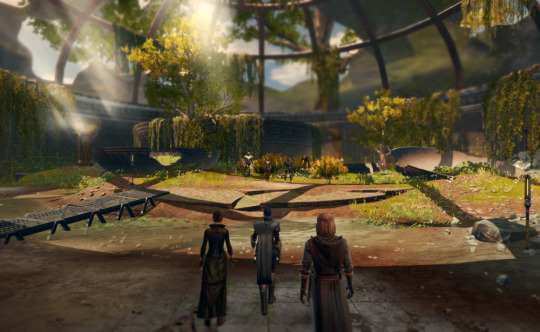




into the enclave
#swtor#swtor 6.3#secrets of the enclave#swtor 6.3 spoilers#secrets of the enclave spoilers#jedi knight
34 notes
·
View notes
Photo
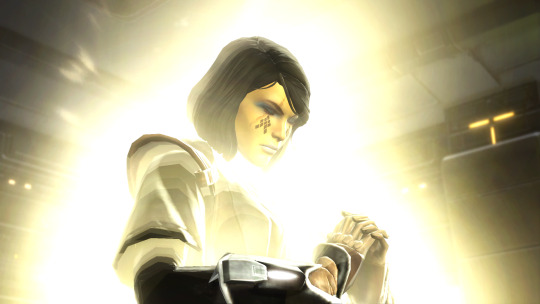
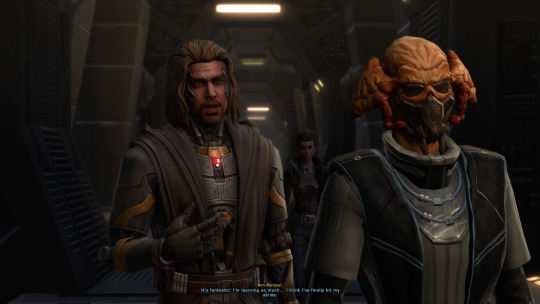

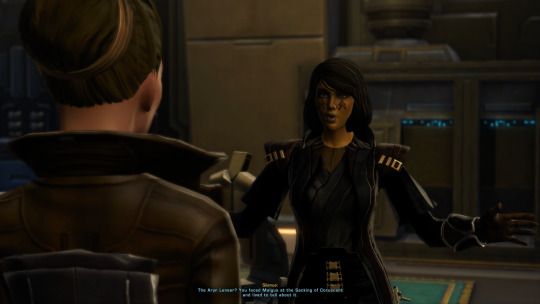
SIL JEDI-ING! ARN! ARYN! SIL FANPERSONING OVER ARYN (VERY VERY CANON)!! already enjoying this way more on pubside than I did with ry :D
ALSO ARYN HAS A THEME!!!!!!!!
youtube
sounds kinda like rey’s theme but IT’S GOOD
#swtor 6.3 spoilers#dark descent spoilers#secrets of the enclave spoilers#ramblings#oc: silanu andraa
20 notes
·
View notes
Text
Really still enjoying the ~feature~ in the Secrets of the Enclave flashpoint where the way they made the Graul’s special attack that makes you panic and run around and not be able to use any of your abilities for a couple seconds was to unlock your fucking quickbars so that if you try to use any abilities you fling them off into oblivion and that they still haven’t fixed that
#november plays swtor#secrets of the enclave spoilers#I guess?#trying to get more toons through all the content and that fight makes me Want To Die#I’ll have just built into my rotation and then suddenly I’ve either duplicated an ability#or thrown one off my bar#and I can stop fighting to do a mid-fight UI reset I guess#but Forced Companion One is kind of a trash healer tbh and would gladly let me die while I do that#luckily Forced Companion Two is a Combat Support Droid in disguise
6 notes
·
View notes
Photo

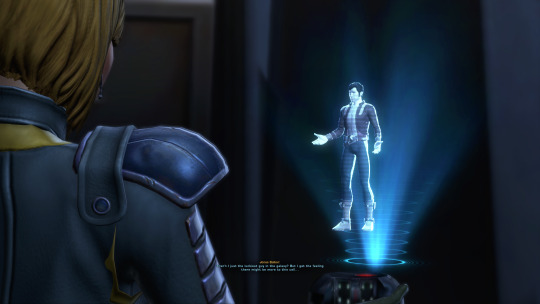
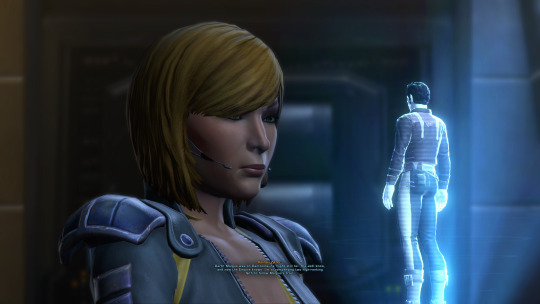
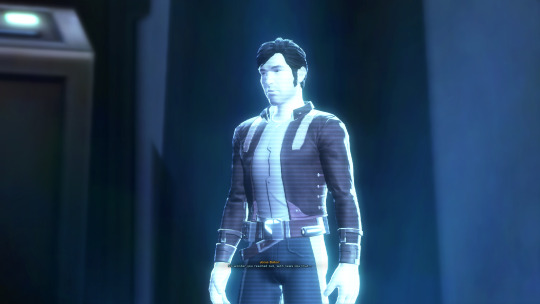
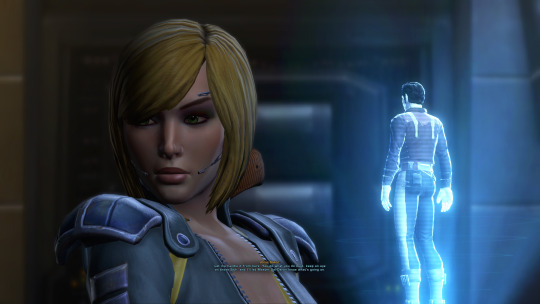
#swtor#star wars: the old republic#secrets of the enclave#secrets of the enclave spoilers#keshani zythor#imperial agent#swtor imperial agent#Jonas Balkar#saboteur
11 notes
·
View notes
Text
Dashpocalypse 2021 - Dantooine Edition
All right! The patch is done, the puppy has been entertained (for now), and I have made probably the first of very questionable decisions today:

Drinking a Starbucks Refresher at 1pm. My first prediction for the day: Future!Me will be cursing this decision around midnight.
No matter! Sacrifices must be made! For the Enclave! Or something.
Also, when I said the puppy was entertained, he begs to differ:
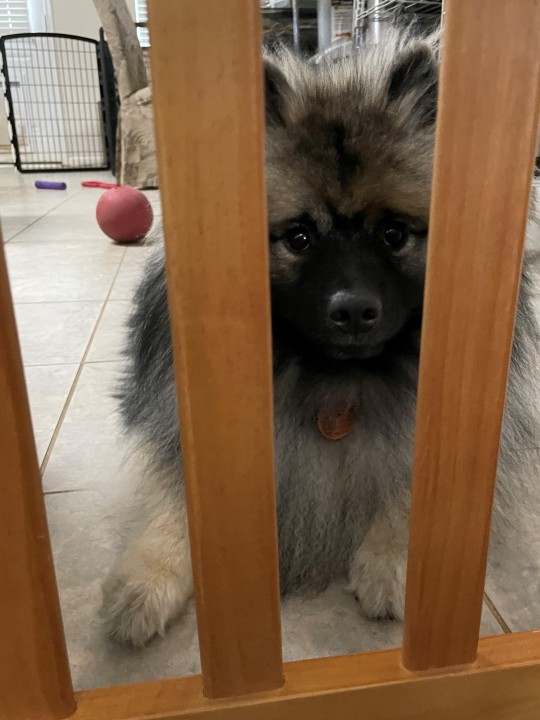
“Why is mother so cruel? Why does mother not let me pounce her endlessly and throw toys at her face when she is on the computar? All I want is to love you, Mother. And climb up on your shoulders and drape my paws around your neck so we become one giant Griffobot who will raze destruction across the cityscape with our super sonic shrieks. Is that so much to ask for?”
I digress. Patch time!
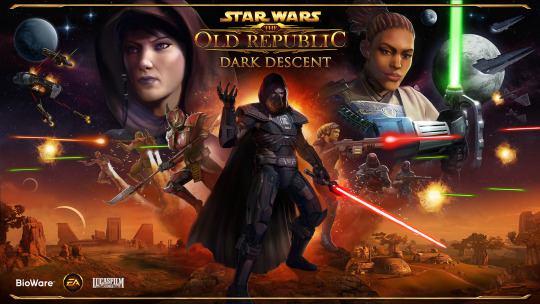
I’m going in!
#swtor 6.3#swtor 6.3 spoilers#swtor spoilers#swtor release week#swtor patch day#secrets of the enclave#dantooine flashpoint#dashpocalypse#grey's silly swtor tag
48 notes
·
View notes
Photo

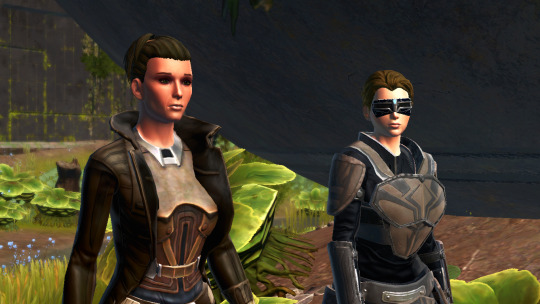
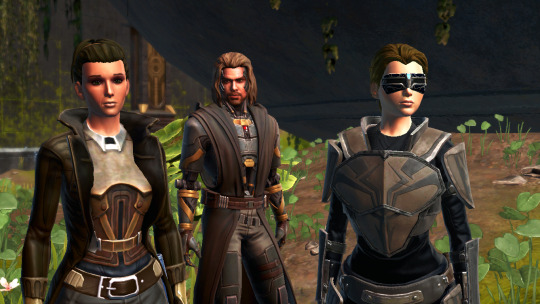
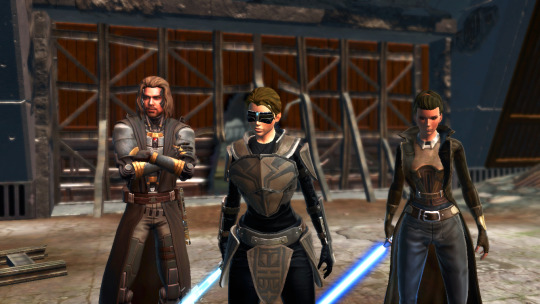
days out with friends
#beating up malgus is a cross-generational activity#swtor spoilers#swtor 6.3#secrets of the enclave#oc: yalla'ra#jedi knight#miraluka#arn peralun#aryn leneer
17 notes
·
View notes
Text
I've mostly had my head in FFXIV for the last few months, and the combo of Rise of Skywalker and The Mandalorian Season 2 still have me in a "Star Wars and I are seeing other people right now" mood. I've been logging in to catch SWtOR story content when it drops, though. I just played through story mode Secrets of the Enclave. Thoughts under the RM.
For most people, this probably will be a perfectly pleasant update leading to a presumed future expansion where we resolve the issue with Undead Malgus. Unfortunately I read Deceived, the terrible tie-in novel that explains the cinematic with the same title and some background info on said Malgus. It features the first appearance of Terrible Jedi Aryn Leneer and the family she mentions, retired Havoc Squad operative Zeerid “Z” Korr and his daughter Arra. I liveblogged it here back in the day, so check out this tag if you are entertained by snarky hate-reading.
Pretty much, just imagine Ellekai cold-reading Aryn, and the dialog in story mode all consisting of tense-to-borderline-hostile dialectic, and you’ve got a fair idea of what was happening in my head.
Aryn: “A lot of awful, painful things happened here, including the Council wiping the memories of people who left the Order.”
Ellekai: “It’s pertinent to mention that that procedure wasn’t routine protocol for all people who chose to exit the Order. It was deployed once ever, on a Super War Criminal presently leading a catastrophically bloody, destructive offensive against the Republic, as a last-ditch alternative to execution. It was attempted or proposed twice more, on another Super War Criminal- you know I’ve talked to both of them, right? -and a suspected mass-murderer of children respectively. Specificity matters.”
...
Aryn: “Malgus went this way”
Ellekai: “How do you know?”
Aryn: “Because I’m a Force-Empath and you’re not”
Ellekai:
Aryn:
Ellekai: *a solid two minutes of ugly, barking laughter*
...
Aryn: “So if we find Malgus down here, I’m gonna kill him. Heh, I maybe should have mentioned that before, I guess.”
Ellekai: ...
Ellekai: “25 years, a job change, and nothing’s changed for you, has it? You haven’t learned. You’re still weaponizing other people’s good will, without their informed consent, for emotionally-incontinent, selfish, vengeful ends. You may think you loved Master Zallow, but you never listened to him.”
...
On the debrief, one of the other masters, via SpaceZoom: “In the interest of operational security, we should pause while non-members of the Jedi Order exit the conversation.”
Arn: *bows up*
Ellekai: “Due respect, Master Jedi, the issue is not that Leneer is a former Jedi, it’s that she’s a violent idiot. Specificity matters.”
#swtor#secrets of the enclave#swtor spoilers#ellekai#Terrible Jedi Aryn Leneer#jedibrarian is a pedantic turd#*Forrest Gump voice* And that's all I have to say about that
11 notes
·
View notes